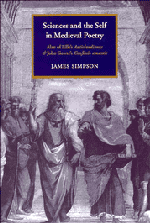 Sciences and the Self in Medieval Poetry
Sciences and the Self in Medieval Poetry Published online by Cambridge University Press: 15 December 2009
INTRODUCTION
In Book VII of Confessio amantis Genius recounts the parts of philosophy to Amans, the second element of which is Rhetoric. Words are the most powerful amongst earthly things, and they should, accordingly, be truthful:
For if the wordes semen goode
And ben wel spoke at mannes Ere,
Whan that ther is no trouthe there,
Thei don fulofte gret deceipte;
For whan the word to the conceipte
Descordeth in so double a wise,
Such Rethorique is to despise
In every place, and forto drede.
(vii. 1550–7)But if plain, unequivocal speech is recommended to a king here, it is clear that Gower's larger sense of persuasive discourse cannot be summarized so simply. For in the model of the poem which I have suggested in the last two chapters, we can see how verbal strategy must be characterized by a good deal of ‘double speche’ (vil.1733). The whole poem, I have been arguing, is generated out of fundamental incongruences and indirections, which are particularly pronounced in the figure of Genius. Once we understand the psychological status of Genius, we realize that his claim to authority over Amans cannot be accepted without qualification: he is, after all, Amans's genius, the very imaginative faculty which feeds the concupiscent will, with which he is so closely associated. But, we have observed, his potential allegiances are also wider, through his connection with the reason.
To save this book to your Kindle, first ensure [email protected] is added to your Approved Personal Document E-mail List under your Personal Document Settings on the Manage Your Content and Devices page of your Amazon account. Then enter the ‘name’ part of your Kindle email address below. Find out more about saving to your Kindle.
Note you can select to save to either the @free.kindle.com or @kindle.com variations. ‘@free.kindle.com’ emails are free but can only be saved to your device when it is connected to wi-fi. ‘@kindle.com’ emails can be delivered even when you are not connected to wi-fi, but note that service fees apply.
Find out more about the Kindle Personal Document Service.
To save content items to your account, please confirm that you agree to abide by our usage policies. If this is the first time you use this feature, you will be asked to authorise Cambridge Core to connect with your account. Find out more about saving content to Dropbox.
To save content items to your account, please confirm that you agree to abide by our usage policies. If this is the first time you use this feature, you will be asked to authorise Cambridge Core to connect with your account. Find out more about saving content to Google Drive.